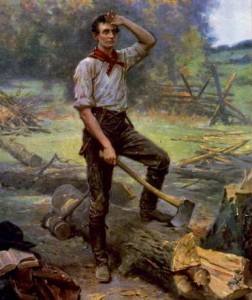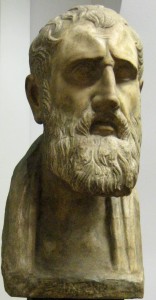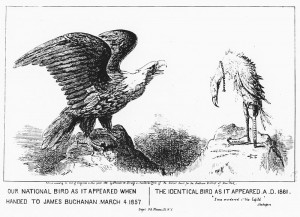I. 150 years ago this week there was news from Springfield, Illinois about President-elect Abraham Lincoln. He entertained some visitors:
SPRINGFIELD, Ill., Sunday, Jan. 13. …
Mr. LINCOLN was presented this forenoon with a gold-headed rosewood cane, valued at $250, by Messrs. JAMES CHURCHMAN and SAMUEL GAMAGE, of San Francisco, in the name of C.W. YOUNG, of Nevada City.
W. JONES, an Indiana farmer, for whom Mr. LINCOLN split rails thirty years ago, is here on a visit to his former hired hand. (New York Times Archive)
II. A reporter for the Missouri Democrat also visited Lincoln. From The New-York Times January 14, 1861:
Another-Interview with Mr. Lincoln.; HIS OPINION OF COMPROMISES.
A correspondent of the Missouri Democrat gives the following particulars of a visit to Mr. LINCOLN:
“We found Mr. LINCOLN in his parlor surrounded by some six or eight gentlemen, who all proved to be temporary visitors like ourselves. Mr. LINCOLN met us with a frank welcome, shaking hands with us, and at once by his words and his manner, making us feel that our call was no intrusion; and on his invitation, we were soon seated with the circle of gentlemen who occupied his parlor. The subject of conversation was politics, and Mr. LINCOLN expressed himself upon every topic which was brought up with entire freedom. He said, at one period in the conversation, ‘he hoped gentlemen would bear in mind that he was not speaking as President, or for the President, but only exercising the privilege of talking which belonged to him in common with private citizens.’
I chose rather to be a listener than a talker, and paid careful attention both to Mr. LINCOLN’s matter and manner, and although he seemed to talk without regard to the fact of his being the President elect, yet it was discoverable that he chose his words and framed his sentences with deliberation, and with a discretion becoming his high position.
He was asked, ‘Do you think the Missouri Compromise line ought to be restored?’ He replied that although the recent Presidential election was a verdict of the people in favor of freedom upon all the Territories, yet personally he would be willing, for the sake of the Union, to divide the Territory we now own by that line, if in the judgment of the nation it would save the Union and restore harmony. But whether the acquisition of Territory hereafter would not reopen the question and renew the strife, was a question to be thought of and in some way provided against.
He had been inquired of whether he intended to recommend the repeal of the anti-Fugitive Slave laws of the States? He replied that he had never read one of them, but that if they were of the character ascribed to them by Southern men, they certainly ought to be repealed. Whether as President of the United States he ought to interfere with State legislation by Presidential recommendation, required more thought than he had yet given the subject. He had also been asked if he intended to interfere or recommend an interference with Slavery or the right of holding slaves in the dock yards and arsenals of the United States? His reply was. ‘Indeed, Sir, the subject has not entered my mind.’ He was inquired of whether he intended to recommend the abolition of Slavery in the District of Columbia? to which he replied, ‘Upon my word I have not given the subject a thought.’ A gentleman present said to him, ‘Well, Mr. LINCOLN, suppose these difficulties should not be settled before you are inaugurated, what will you do?’ He replied with a smile, ‘Well, I suppose I will have to run the machine as I find it.’
In speaking on the subject of a compromise, he said: It was sometimes better for a man to pay a debt he old not owe, or to lose a demand which was a just one, than to go to law about it; but then, in compromising our difficulties, he would regret to see the victors put in the attitude of the vanquished, and the vanquished in the place of the victors.’ He would not contribute to any such compromise as that.
It was discernible in the course of Mr. L.’s conversation that he duly appreciates the difficulties which threaten his in-coming Administration; also, that he regarded himself as grossly misrepresented and misunderstood at the South; nor did he conceal what was manifestly an invincible conviction of his honest and intelligent mind, that if the South would only give him a fair trial, they would find their constitutional rights as safe under his Administration as they had ever been under the Administration of any President.” (Entire article at The New York Times Archive)
III. I’d be interested in what other readers of the above article think. At first read I was not too impressed. It kind of left me cold – Lincoln, as a coy politician, seemed to be saying nothing. He seems to be presaging Muhammad Ali in “dancing like a butterfly” – I guess we might have to wait awhile for the bee sting. He never read any of the Personal liberty laws, but, my goodness, if they are really that bad the northern states should repeal them. Of course, a U.S. president would have no right to meddle in state laws – at least not state laws of that nature.
The paragraph about compromise seemed a lot of lawyerly obfuscation at first. As I reread it, Lincoln seems to be saying that compromise might at times be a judicious course to follow, but since the Republicans won the election there is no way they are going to be doing all the giving in order to secure a compromise. I guess there is some bee in there after all.
I realize we’re only half way through the interregnum. There’s still almost two months before Lincoln’s inauguration. The Buchanan administration is running things (sort of). Lincoln has no power; Buchanan does not want to do too much because he’s almost done and because he has dough-face tendencies; and the country is falling apart.
A local, strongly pro-Democrat Party newspaper published an editorial in early January 1861 that one could read as merely a highly partisan harangue against the Republican party in general and Lincoln in particular. However, the nugget of truth that has survived is the policy vacuum between Washington, D.C. and Springfield, Illinois.
From The Courier Seneca Falls, NY. January 5, 1861:
The Impending Revolution
The threatening aspect of our political affairs is well calculated to alarm the most conservative. …
[The Republican party’s] triumph has brought the country to the verge of revolution and civil war. Already the disintegration of the Republic has commenced, and the representatives of the party responsible for this state of things, refuses to abate one iota of their fanaticism to save the Union. Their [sic] is no safety for the Southern States, nor protection to their interests, if the more radical doctrines and views enunciated by the Republican party are carried into effect under the administration of ABRAHAM LINCOLN. The Southern States understand this, and the stoical indifference and silence of the President elect creates the most fearful apprehensions among those who would preserve the Confederacy. Mr. LINCOLN fails to comprehend the dangers and difficulties that environ the country. Unless the Republicans, by their acts in Congress and elsewhere, pursue a wise and conciliatory course, and convince the people that they do not desire the disruption of the Union, upon them must rest the responsibility of the impending revolution. It is certainly time for them to abandon their insane and revolutionary measures; to yield to the impulses of patriotism, and rise to the courage and responsibilities of the emergency.
It seems that the four month interregnum from November 1860 to March 1861 was way too long. Lincoln’s going to “run the machine” as he finds it. The wheels may have fallen off by then. But I’m not sure what else Lincoln could have legitimately done except bide his time.
Notes
1) The image of Zeno of Citium is under the Creative Commons License and more information can be found here.
2) The entire editorial in the Seneca Falls newspaper can be read here
3) Information about Nevada City, California (appropriately a Gold Rush town) is here
4) Regarding the W. Jones that hired Lincoln to split rails: suite101 has an article about the William Jones Home in Gentryville, Indiana. There’s evidence that Lincoln was a clerk in Jones’ store; since Jones also had a farm I would think it’s possible that Lincoln split rails for him. (The suite101 article also mentions that Jones was a Union soldier who died during the Battle of Atlanta when a cannonball blew his head off.) The Smithsonian has a page displaying actual wedges that Lincoln used to split rails.
5) The only extra information I find at America’s Library about the image of Lincoln splitting rails is that it was created c.1909.
6) The editorial from the Seneca Falls newspaper can be found at the Seneca Falls, New York public library at 47 Cayuga Street in a three-ring binder called Seneca Falls History and Events: Chronicles of Area News 1860-1869 Compiled by Village Historian Roberta Halden. (It can also be found in a similar binder about Civil War events in Seneca Falls). I have this image of the village historian patiently rescuing whatever clippings she can from old, beat up newspapers and preserving them for us. Cool stuff! The January 5th date is written in ink on the clipping.




Pingback: Missed-cellany #1: Got Pass? | Blue Gray Review